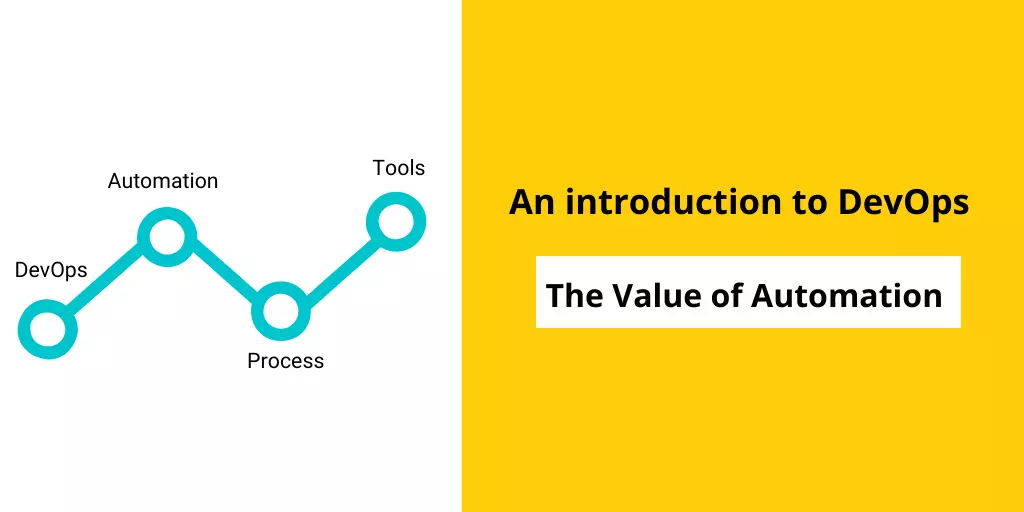An introduction to DevOps and the value of Automation

Overview of DevOps
DevOps is a set of practices that integrates software development and IT operations. It enhances software quality by shortening the development life cycle and thereby providing faster delivery.
Successful implementation of DevOps practices can minimize bugs and failures. Automation can be used for repetitive and error-prone tasks thereby eliminating manual interventions. Some of the key benefits of using DevOps include a focus on automation, Continuous Integration Continuous Delivery (CI/CD), monitoring and controlling of the process, etc.
Automation is considered as the cream of the cream feature that makes DevOps stand apart from other traditional product development methods.
DevOps Automation
Technological advancements have resulted in enterprises and teams brainstorming frequently as to how they can get their products in the market within the minimum time frame as well as to meet the customer expectations. As customer requirements are evolving organizations are adopting agile practices to better collaborate on projects and enable a fruitful exchange of information that could shorten the development life cycle. Gone are the days when you needed to develop software for a specific application. Software nowadays has become a service, which is an ongoing process. Traditional development methodologies like the waterfall model which followed a sequential flow of processes were once the most sought-after model. These have become completely obsolete now.
DevOps not only follows a concurrent model but places automation as its bedrock, thereby speeding up the development cycle of products. Automation focuses on repetitive, error-prone tasks that could significantly consume a major portion of the development cycle. It also focuses on minimizing the human intervention required and eliminating bugs and errors.
Automation increases overall efficiency and productivity by focusing on creating a faster and efficient development cycle. Automation in itself is an inalienable part of DevOps.
Automation starts from the code generation process and lasts till the product is in the deployment phase. Automation minimizes manual burden and enhances efficiency.
Let us see some of the key benefits that could be availed out of automating your process.
1.Scalability
DevOps automation can enable enterprises and organizations to scale their teams and other resources depending on the requirements. Scaling a manual process could be a daunting task and results in wastage of time, money, and resources apart from the enhanced development life cycle process.
2. Speed
Automation can indeed ensure that your products and services go through a faster development cycle right from the code generation to the very deployment stage of the product. The automated process is independent of the team composition and time and thereby eliminates undue delays.
3. Efficiency and Productivity
Automation not only speeds up the whole development cycle but also enhances the efficiency and productivity of the overall process as well as the team and individual members. Automation can drastically reduce manual interventions for repetitive and error-prone tasks. It enables the teams to focus better on the core development process. Automation can eliminate failures in testing procedures and provides better management of tasks that are associated with cross-project requirements.
4.Flexibility
Automation provides flexibility both in terms of time and the development process in general. The processes can be configured easily to meet the varying demands and requirements. Automation ensures that even the absence of some team members does not affect the development life cycle.
Which all processes can be automated?
Depending on the demands and requirements different teams may have different priorities. The commonly automated processes include
1. Software Testing
Prior to the deployment and delivery of the software, it is imperative that it is being tested. It will be a mammoth task to carry out manual testing as these processes are often repetitive. DevOps tools like Selenium and Watir can be used for testing software before its deployment.
2. Log Management
Log management solutions enable automatic generation, aggregation, and analysis of data. Manual monitoring of data is a cumbersome process. Automation provides better solutions to analyze these logs using dedicated management tools.
3. Processes Requiring Continuous Monitoring and Control
It is next to impossible to have manual monitoring and tracking of the changes within the development process. Automation enables better monitoring of performance, security, etc.
4. Continuous Integration Continuous Delivery (CI/CD)
CI/CD processes are the basic and the core functionalities in any development life cycle. It is the main functionality that needs to be automated to ensure that the product is deployed and delivered promptly.
Software Used for DevOps Automation
Software deployed for DevOps automation can be open source or proprietary and licensed with royalties. Puppet is used for cross-platform development, Docker can be used for development environments.
Jenkins, Kubernetes, Bamboo, TeamCity, and Vagrant are used for continuous integration and continuous delivery (CI/CD). DevOps configuration management tools include Consul, Etcd, and Vault. Splunk and Graphite are used for monitoring. Selenium and Watir are used for testing purposes. Terraform, Ansible, and Chef are used as infrastructure provisioning tools. Coding tools include Git, Jira, etc. Containerization tools include OpenStack, Docker, Vagrant, etc. Depending on the demand and requirements you can choose the best combination of tools to implement a comprehensive development strategy.
Automation is one of the most imperative features that define DevOps. It’s the presence of automation features at the heart of DevOps that makes it to be accepted widely.
Activelobby implements and follows DevOps practices right from the very start of the development process. We have a DevOps team that provides you with 24 by 7 support. Our processes are hundred percent automated. We also adhere to the DevSecOps standards, which ensure end-to-end security of the applications and services.
We have the best-in-class DevOps tools. Our DevOps services help you in increasing your infrastructure agility, shortening your releases, improving scalability and reliability. With Activelobby at your service, you stay on top of the competition.
